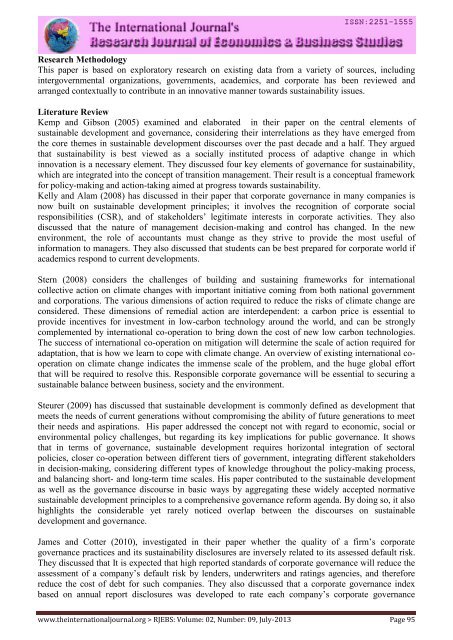Research Journal of Economics & Business Studies - RJEBS - The ...
Research Journal of Economics & Business Studies - RJEBS - The ...
Research Journal of Economics & Business Studies - RJEBS - The ...
Create successful ePaper yourself
Turn your PDF publications into a flip-book with our unique Google optimized e-Paper software.
<strong>Research</strong> Methodology<br />
This paper is based on exploratory research on existing data from a variety <strong>of</strong> sources, including<br />
intergovernmental organizations, governments, academics, and corporate has been reviewed and<br />
arranged contextually to contribute in an innovative manner towards sustainability issues.<br />
Literature Review<br />
Kemp and Gibson (2005) examined and elaborated in their paper on the central elements <strong>of</strong><br />
sustainable development and governance, considering their interrelations as they have emerged from<br />
the core themes in sustainable development discourses over the past decade and a half. <strong>The</strong>y argued<br />
that sustainability is best viewed as a socially instituted process <strong>of</strong> adaptive change in which<br />
innovation is a necessary element. <strong>The</strong>y discussed four key elements <strong>of</strong> governance for sustainability,<br />
which are integrated into the concept <strong>of</strong> transition management. <strong>The</strong>ir result is a conceptual framework<br />
for policy-making and action-taking aimed at progress towards sustainability.<br />
Kelly and Alam (2008) has discussed in their paper that corporate governance in many companies is<br />
now built on sustainable development principles; it involves the recognition <strong>of</strong> corporate social<br />
responsibilities (CSR), and <strong>of</strong> stakeholders’ legitimate interests in corporate activities. <strong>The</strong>y also<br />
discussed that the nature <strong>of</strong> management decision-making and control has changed. In the new<br />
environment, the role <strong>of</strong> accountants must change as they strive to provide the most useful <strong>of</strong><br />
information to managers. <strong>The</strong>y also discussed that students can be best prepared for corporate world if<br />
academics respond to current developments.<br />
Stern (2008) considers the challenges <strong>of</strong> building and sustaining frameworks for international<br />
collective action on climate changes with important initiative coming from both national government<br />
and corporations. <strong>The</strong> various dimensions <strong>of</strong> action required to reduce the risks <strong>of</strong> climate change are<br />
considered. <strong>The</strong>se dimensions <strong>of</strong> remedial action are interdependent: a carbon price is essential to<br />
provide incentives for investment in low-carbon technology around the world, and can be strongly<br />
complemented by international co-operation to bring down the cost <strong>of</strong> new low carbon technologies.<br />
<strong>The</strong> success <strong>of</strong> international co-operation on mitigation will determine the scale <strong>of</strong> action required for<br />
adaptation, that is how we learn to cope with climate change. An overview <strong>of</strong> existing international cooperation<br />
on climate change indicates the immense scale <strong>of</strong> the problem, and the huge global effort<br />
that will be required to resolve this. Responsible corporate governance will be essential to securing a<br />
sustainable balance between business, society and the environment.<br />
Steurer (2009) has discussed that sustainable development is commonly defined as development that<br />
meets the needs <strong>of</strong> current generations without compromising the ability <strong>of</strong> future generations to meet<br />
their needs and aspirations. His paper addressed the concept not with regard to economic, social or<br />
environmental policy challenges, but regarding its key implications for public governance. It shows<br />
that in terms <strong>of</strong> governance, sustainable development requires horizontal integration <strong>of</strong> sectoral<br />
policies, closer co-operation between different tiers <strong>of</strong> government, integrating different stakeholders<br />
in decision-making, considering different types <strong>of</strong> knowledge throughout the policy-making process,<br />
and balancing short- and long-term time scales. His paper contributed to the sustainable development<br />
as well as the governance discourse in basic ways by aggregating these widely accepted normative<br />
sustainable development principles to a comprehensive governance reform agenda. By doing so, it also<br />
highlights the considerable yet rarely noticed overlap between the discourses on sustainable<br />
development and governance.<br />
James and Cotter (2010), investigated in their paper whether the quality <strong>of</strong> a firm’s corporate<br />
governance practices and its sustainability disclosures are inversely related to its assessed default risk.<br />
<strong>The</strong>y discussed that It is expected that high reported standards <strong>of</strong> corporate governance will reduce the<br />
assessment <strong>of</strong> a company’s default risk by lenders, underwriters and ratings agencies, and therefore<br />
reduce the cost <strong>of</strong> debt for such companies. <strong>The</strong>y also discussed that a corporate governance index<br />
based on annual report disclosures was developed to rate each company’s corporate governance<br />
www.theinternationaljournal.org > <strong>RJEBS</strong>: Volume: 02, Number: 09, July-2013 Page 95
















